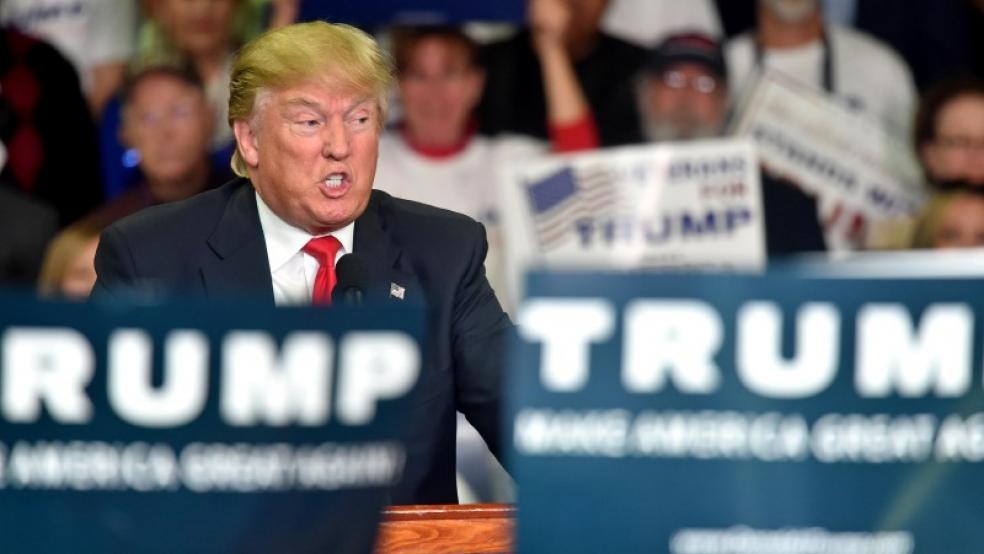Donald Trump’s hostile takeover of the Republican Party is entering its final stage, the day after the billionaire frontrunner delivered a dominant performance in the most recent presidential primaries, more than doubling his lead in the delegate count in the process.
Trump’s general disdain for the GOP establishment and its media allies was never more evident than this morning, when he called in to the Fox and Friends morning program and used the network’s own show as a platform to announce that he was skipping the Republican National Committee-sanctioned debate scheduled for Monday night, which was supposed to be hosted by Fox News Channel.
Related: Donald Trump Swaggers to Another Campaign Milestone
Trump said that he would instead be delivering a major speech Monday night, in Washington, to the American Israel Public Affairs Committee, a lobbying organization dedicated to supporting the interests of Israel.
Shortly afterward, one of Trump’s remaining competitors, Ohio Gov. John Kasich, said through a spokesman that if Trump wouldn’t be there Kasich wasn’t going to bother to show up either. Within hours, Fox News announced that the debate had been cancelled.
Also on Wednesday morning, in another phoned-in appearance on CNN, Trump warned the party that it should expect violence if he is denied the nomination despite winning a plurality of delegates to the nominating convention in July. Trump needs to collect 1,237 delegates to win the nomination on a first ballot vote.
Right now, the main focus of his two remaining competitors, Kasich and Texas Sen. Ted Cruz, is not so much winning outright as denying Trump a first ballot majority. After that, when delegates are no longer bound to a certain candidate, they feel they might be able to engineer victory over Trump in a floor fight.
Related: Hillary Clinton Breaks the Back of the Sanders Revolution
“I think we'll win before getting to the convention,” he said. “But I can tell you, if we didn't and if we're 20 votes short or if we're 100 short and we're at 1,100 and somebody else is at 500 or 400? Because we're way ahead of everybody, I don't think you can say that we don't get it automatically.”
He added, “I think you'd have riots. I think you'd have riots. I'm representing … many, many millions of people.”
RNC spokesman Sean Spicer told Politico later Wednesday morning, “Well first of all, I assume he’s speaking figuratively. I think if we go into a convention, whoever gets 1,237 delegates becomes the nominee. It’s plain and simple.”
Of course, as Spicer well knows, there’s good reason to believe that Trump might not be speaking figuratively at all. He has called for violence from the stage during his rallies, and promised to pay the legal fees of anyone who commits it. Over the weekend, he used Twitter to threaten Democratic candidate Bernie Sanders, suggesting that he would send his supporters to break up a Sanders rally.
Related: It Took Trump to Bring Obama and GOP Leaders Together
If a political party is no longer in charge of the process by which candidates seeking to lead it make their case to voters and has to ignore, not condemn, threats of violence by its leading candidate, it’s not clear that there is much of a party left.
The absurdity of the situation was clear Wednesday from the reaction of Cruz to the news that Trump would not debate on Monday. Getting Trump to himself – or close to it – on a debate stage has long been a major goal for Cruz, an accomplished debater who no doubt thinks he could humiliate Trump given the opportunity.
But instead of doing the humiliating, Cruz was the one disrespected on Wednesday. Trump implied that he wasn’t worth debating, and Kasich essentially agreed.
Cruz was reduced to resurrecting “#DuckingDonald,” the Twitter hashtag he used the last time Trump bailed on a Fox News debate, which had about as much effect then as it is likely to have now: none.





